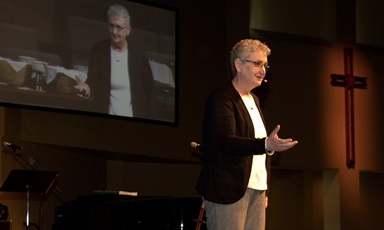On the eve of the special General Conference focused on the role of LGBTQ people in the church, more than 100 United Methodist clergy released an open letter to the LGBTQ people in the denomination’s pews.
The clergy who signed the letter are all members of the unofficial advocacy group, UM Queer Clergy Caucus.
“We thank God for the work of the Holy Spirit in and through you, for the blessings you have been to God’s people, for your witness to the kin-dom of God,” the letter said, “and for the steadfastness of your faith despite the many trials you have endured in the name of Christ.”
Altogether, 129 United Methodists have signed what they titled “A Love Letter to LGBTQIA+ UMC Members and Friends.” All come from the United States.
Fourteen identified themselves only as the Hidden Faithful and their conference.
Clergy identified as “self-avowed practicing homosexuals” could face repercussions under church law and potentially lose their clergy credentials.
Many of the signers were among the 111 United Methodist clergy and clergy candidates who came out as gay just ahead of the previous gathering of the denomination’s top lawmaking assembly in 2016.
During that General Conference, long-simmering debate over the denomination’s stance on homosexuality boiled over with open talk of splitting the church. Delegates authorized the denomination’s bishops to appoint a commission to find ways to help the church stay together — and to call a special General Conference to take up the commission’s proposals.
That special meeting is now about to begin with a day of prayer on Feb. 23 and continue with legislative action through Feb. 26.
During the gathering, 864 delegates from around the globe will consider very different directions for ministry with LGBTQ individuals.
The Rev. Austin Adkinson, pastor of Haller Lake United Methodist Church in Seattle and a reserve delegate at General Conference from the Pacific Northwest Conference, drafted the letter.
“We wanted to reach out to people who are watching the proceedings of General Conference and are feeling hurt by the dialogue and hurt that we even have to have this conversation,” he said. “We wanted to reach out and celebrate them during what is going to be a hard few days.”
He added that they also hope the letter helps inform delegates’ conversations.
“We hope it serves as a reminder that we are not just debating an issue, that there are real people involved.”
The Book of Discipline, the denomination’s governing document, has stated since 1972 that all individuals are of sacred worth but the practice of homosexuality “is incompatible with Christian teaching.” It currently lists being a “self-avowed practicing” gay clergy member as well as officiating at same-sex unions as chargeable offenses under church law. However, a number of church leaders have publicly defied these prohibitions.
Delegates will be able to take up and refine legislation that will amend the Discipline.
Among the options on the table are plans that boost enforcement against violating restrictions related to homosexuality or other plans that remove the restrictive language. Also a possibility is legislation that reorganizes the denomination along theological lines. Still other proposals would allow churches to exit the denomination with their property.
The letter did not endorse any particular plan before General Conference.
“None of the plans General Conference will consider affirms the holy value of queer lives and the contributions we make, have made, and will make in the life of the church,” the letter to LGBTQ lay people said. “Even the queer clergy caucus leaders didn’t think that was a realistic goal at this time.”
The Rev. Alex da Silva Souto, letter signer and pastor of New Milford United Methodist Church in Connecticut, is among the few openly LGBTQ delegates to General Conference.
“Representation has been a problem,” he said. “We want our LGBTQI siblings to know we are in this together through and through.”
General Conference delegates will come from multiple countries where laws and attitudes about homosexuality vary.
Just to give an example, United Methodists have congregations in 14 African countries where same-sex activity is a crime. The blog UM & Global, curated by David W. Scott on behalf of United Methodist professors of mission, offers an overview of the different attitudes in the multiple nations United Methodists attend church.
Even amid that diversity, the Rev. Althea Spencer Miller said she sees United Methodists who want to stay in ministry together. She is a professor at United Methodist Drew Theological School and one of the letter contributors.
“My read is that there is a significant proportion of the church that doesn’t want to see the entirety of the church’s ministry in the U.S. and the world damaged by what’s going on.”
Hahn is a multimedia news reporter for United Methodist News Service. Contact her at (615) 742-5470 or [email protected]. To read more United Methodist news, subscribe to the free Daily or Weekly Digests.
Like what you're reading? Support the ministry of UM News! Your support ensures the latest denominational news, dynamic stories and informative articles will continue to connect our global community. Make a tax-deductible donation at ResourceUMC.org/GiveUMCom.




